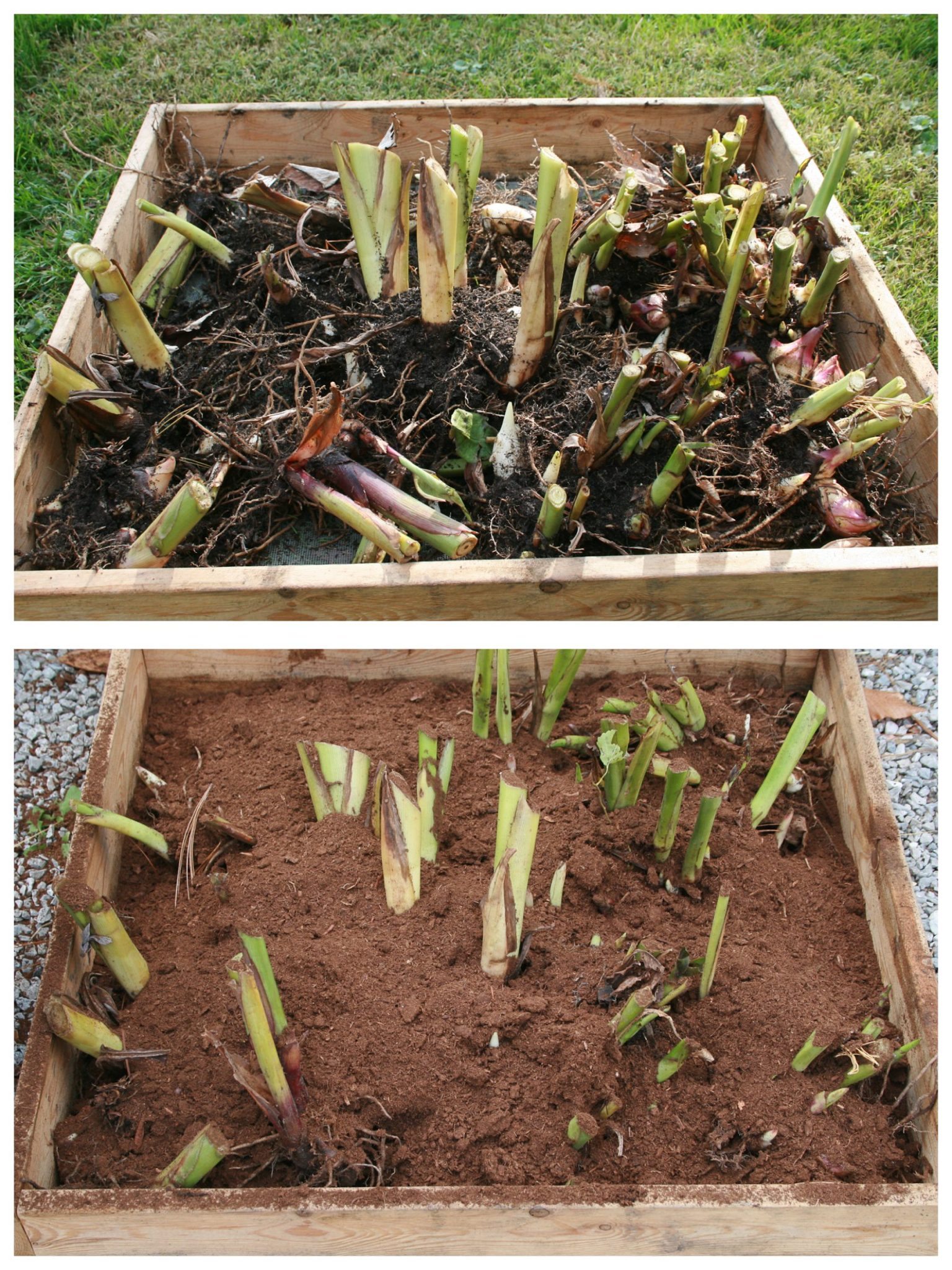Canna lilies are native to tropical and subtropical regions, which means they’re not accustomed to cold weather. However, some gardeners have had success overwintering canna lilies by digging up the bulbs and storing them indoors over winter. With proper care, your canna lily bulbs should survive the winter and bloom again next spring.
Canna Winterization – Canna Lily Hibernation
If you live in an area where the temperature dips below freezing in the winter, you might be wondering if your cannas will survive. The good news is that most cannas are actually quite tolerant of cold weather and can survive a light frost with no problem. However, if you’re expecting a heavy frost or prolonged periods of freezing temperatures, it’s best to take some precautions to ensure your plants don’t get damaged.
One way to protect your cannas from the cold is to dig them up and store them indoors over winter. This is especially important for tropical varieties that are not as cold-tolerant as other types. If you can’t dig them up, try covering the plants with a layer of mulch or straw to insulate them from the cold air.
Another option is to treat your cannas as annuals and simply replant them each spring. This is easier said than done if you have established plants that you want to keep, but it’s worth considering if you’re not sure they’ll make it through the winter.
No matter what method you choose, make sure to bring your cannas indoors or cover them up before the first frost hits.
With a little care, they should come back strong next spring!
Canna Lily Winter Care
Canna lilies (Canna x generalis) are a popular summer flowering bulb. They are easy to grow and maintain, and their large, showy flowers add a tropical touch to any garden. However, cannas are not cold hardy, so they must be dug up and overwintered indoors in colder climates.
With a little care, you can enjoy your cannas for many years to come.
When the weather starts to cool in fall, it’s time to start preparing your cannas for winter. Stop fertilizing them about six weeks before the first frost is expected.
This will give them time to harden off and prepare for dormancy. Begin by gradually reducing watering until you are only watering them once a week or less. Allow the soil to dry out completely between waterings.
Once the leaves have started to yellow and die back, cut them off at the base of the plant. Then dig up the bulbs, shake off any excess dirt, and store them in a cool (50-60 degree), dry place over winter. Most people wrap their bulbs in newspaper or peat moss before storing them away for the winter months.
With just a little bit of extra care during the winter months, you can keep your cannas healthy and blooming year after year!
Can You Leave Cannas in the Ground Over Winter
Yes, you can leave cannas in the ground over winter, but you will need to take some precautions to ensure that they survive the cold weather. First, make sure to mulch heavily around the plants to insulate them from the cold. You can use straw, leaves, or any other type of organic matter.
Second, water the plants well before the first frost and then keep them dry throughout the winter. This will help prevent them from rot- ting in the wet soil. Lastly, cut back the foliage to about 6 inches above ground level to prevent wind damage.
With these simple steps, your cannas should be able to withstand even the harshest winters.
Can Cannas Survive a Hard Freeze
As the temperatures start to drop in late fall, many gardeners begin to worry about their plants. Will they be able to survive a hard freeze? The answer is maybe.
Cannas are actually pretty tough plants and can withstand quite a bit of cold. However, if the temperatures dip below 20 degrees Fahrenheit (-7 degrees Celsius), they will likely die.
If you live in an area that experiences hard freezes, there are a few things you can do to help your cannas survive the winter months.
First, you’ll want to dig up the bulbs and store them indoors over the winter. Be sure to keep them in a cool, dry place (around 50-60 degrees Fahrenheit is ideal). You can also cut back the foliage and mulch heavily around the base of the plant.
This will help insulate the roots and protect them from extreme cold.
With a little preparation, your cannas should be able to weather a hard freeze without too much trouble.
Can You Leave Cannas in Pots Over Winter
As the weather starts to cool down and winter approaches, you may be wondering if you can leave your cannas in pots over winter. The answer is yes! Cannas are actually quite hardy plants and can withstand colder temperatures than many other tropical plants.
However, there are a few things you should do to prepare your cannas for winter and ensure that they come back healthy and vibrant in the spring.
First, stop fertilizing your cannas about six weeks before the first frost is expected in your area. This will help them to gradually slow down their growth so that they are less likely to be damaged by cold weather.
Next, start reducing watering gradually as well. Allow the soil to dry out more between waterings until you are only watering once every week or two.
When frost is imminent, move your potted cannas indoors if possible.
If not, insulate them as much as possible outdoors by wrapping them in bubble wrap or burlap sacks filled with leaves or straw. You can also mound mulch around the base of the plant to further protect it from cold temperatures.
With a little preparation, you can easily overwinter your cannas in pots and enjoy their beautiful blooms again next spring!
Overwintering Canna Lilies in Pots
When the weather outside turns cold, many gardeners are forced to say goodbye to their beloved plants. But with a little preparation, you can overwinter your cannas in pots and enjoy them for years to come. Here’s what you need to know:
The first step is to select a pot that is large enough to accommodate the roots of your plant. Be sure to choose a pot with drainage holes in the bottom so that excess water can escape.
Next, fill your pot with a well-draining soil mix.
You can find this type of soil at most garden centers or online.
Once your pot is filled with soil, it’s time to Plant your corm (the bulb-like structure that cannas grow from) just below the surface of the soil. Water well and place the pot in a sunny spot.
Cannas are tropical plants, so they will need extra protection from the cold during the winter months. The best way to do this is by covering your pot with straw or leaves and then wrapping it in burlap or bubble wrap. This will insulate the root system and help prevent freezing damage.
If you live in an area where temperatures dip below freezing, you may also want to move your potted cannas indoors for added protection. A garage or basement would work well as long as there is some natural light available. Just be sure not to place them too close to any heat sources such as furnaces or vents which could dry out the roots and damage the plant.

Credit: ahealthylifeforme.com
What Temperature is Too Cold for Canna Lilies?
Canna lilies are tropical plants that thrive in warm weather. They will tolerate some cold, but if the temperature dips below 50 degrees Fahrenheit, they may start to show signs of stress. This can include wilting leaves and slowed growth.
In severe cases, the plant may die back entirely. If you live in an area with cold winters, it’s best to grow canna lilies in containers that can be brought indoors when the temperature starts to drop.
Will Cannas Survive a Freeze?
Cannas are a tropical plant, so they will not survive a freeze. If the temperature drops below 50 degrees Fahrenheit, the leaves of the plant will turn brown and die. The roots may also be damaged by freezing temperatures.
If you live in an area where freezing temperatures are common, it is best to grow cannas in containers so that you can bring them indoors when the weather gets cold.
Can Cannas Be Left in the Ground Over Winter?
Yes, cannas can be left in the ground over winter. They are a hardy plant and can withstand cold temperatures. However, they will need to be well-mulched to protect them from the cold weather.
Can Tulips Survive Freezing Weather If Planted Outside?
Can tulips survive freezing weather if planted outside? planting tulips outdoors in cold climates can be a gamble. While tulips are hardy plants, extreme frost can damage or kill their bulbs. To increase their chances of survival, planting tulips in well-drained soil, providing proper insulation, and mulching the area can help protect them from freezing temperatures.
How Do I Protect My Canna Lilies from Frost?
When the temperatures start to drop in autumn, gardeners have to start thinking about how to protect their plants from the cold. Tender plants like canna lilies need a little extra care to get through the winter unscathed. Here are some tips on how to protect your canna lilies from frost:
-Move them to a sheltered spot: If you live in an area that gets particularly cold or experiences severe frosts, it’s a good idea to move your canna lilies to a more sheltered spot in the garden. This could be against a south-facing wall or under some trees.
-Mulch around the base of the plant: A thick layer of mulch around the base of the plant will help insulate it and protect it from the cold.
Use organic materials like bark chips or straw.
-Cover with fleece or horticultural fleece: If you know there is going to be a heavy frost, you can cover your canna lilies with some sort of protective material. Fleece is ideal as it will let light and moisture through but will keep out the worst of the cold weather.
By following these simple tips, you should be able to keep your canna lilies safe from frost damage this winter.
Conclusion
Canna lilies are a tropical plant that is not typically known to survive in freezing weather conditions. However, there are some things that you can do to help your canna lilies survive the cold weather. One method is to mulch your plants heavily with straw or leaves.
This will insulate the ground around the roots and help to keep them warm. You can also try covering the plants with a tarp or burlap sack to further protect them from the cold. If you live in an area where the winters are particularly harsh, you may want to consider moving your canna lilies indoors for the winter months.
With a little extra care, your canna lilies can survive freezing weather conditions and continue to thrive.






